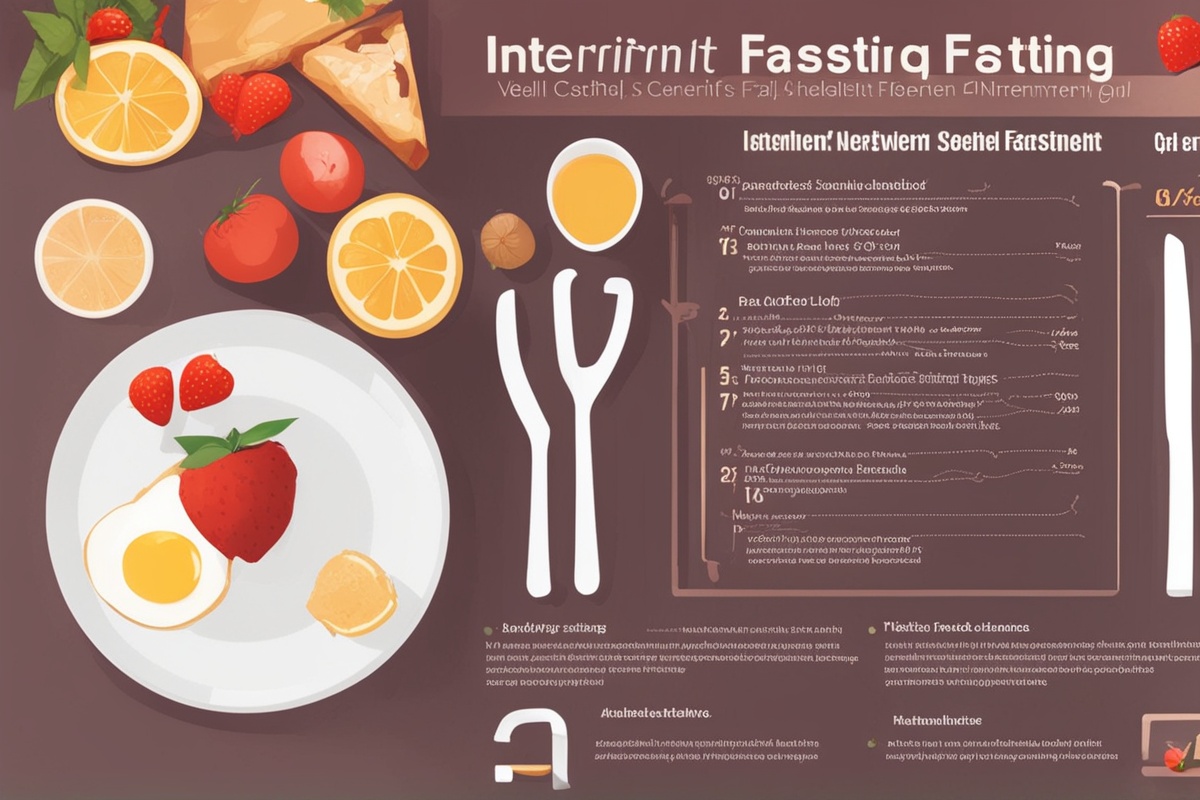Hey there, health enthusiasts! If you’ve been curious about intermittent fasting (IF) and how it can transform your wellness journey, you’re in the right place. Intermittent fasting isn’t just a trendy diet—it’s a lifestyle approach that cycles between periods of eating and fasting to optimize your body’s natural processes. Whether you’re looking to shed a few pounds, improve mental clarity, or simply feel more energized, IF offers a treasure trove of benefits backed by science. In this post, we’ll dive deep into the perks of intermittent fasting, sprinkle in some actionable fasting tips, and help you understand how to make this practice work for you. Let’s explore why so many people are raving about IF and how you can start reaping the rewards!
What Is Intermittent Fasting, and Why Should You Care?
Intermittent fasting is a dietary pattern that alternates between periods of eating and fasting, rather than focusing on what you eat. Popular methods include the 16/8 plan (fast for 16 hours, eat during an 8-hour window) and the 5:2 approach (eat normally for 5 days, restrict calories on 2 days). Unlike traditional diets, IF taps into your body’s innate ability to repair and reset during fasting periods. But why should you care? Research shows that IF can lead to significant health improvements, from weight loss to better blood sugar control (Mattson et al., 2017). It’s not about starvation—it’s about giving your body a break to heal. If you’re new to this, don’t worry; with the right fasting tips, it’s easier than you think to get started.
Weight Loss and Metabolic Boost: A Game-Changer
One of the most celebrated benefits of intermittent fasting is its impact on weight loss. When you fast, your body shifts from burning glucose to burning stored fat for energy—a process called ketosis. Studies have shown that IF can reduce body weight by 3-8% over 3-24 weeks, often outperforming traditional calorie restriction (Varady et al., 2013). Plus, fasting helps lower insulin levels, making fat-burning more efficient. But here’s the kicker: IF also boosts your metabolism by increasing norepinephrine, a hormone that revs up calorie burning (Zauner et al., 2000). If you’re looking for sustainable weight loss, incorporating fasting tips like starting with shorter fasts can make all the difference. It’s not a quick fix, but a powerful tool to reset your relationship with food.
- Start with a 12-hour fast overnight to ease into IF without feeling overwhelmed.
- Stay hydrated during fasting windows to curb hunger pangs and support metabolism.
- Focus on nutrient-dense meals during eating windows to avoid overeating.
- Track your progress weekly to stay motivated and adjust your fasting schedule as needed.
Improved Brain Health and Mental Clarity
Ever feel like your brain is in a fog? Intermittent fasting might just be the clarity booster you need. Fasting triggers the production of brain-derived neurotrophic factor (BDNF), a protein that supports neuron growth and protects against cognitive decline (Mattson et al., 2018). Research also suggests that IF can reduce inflammation in the brain, potentially lowering the risk of neurodegenerative diseases like Alzheimer’s (Longo & Mattson, 2014). On a day-to-day level, many fasters report sharper focus and better mood stability—likely due to stabilized blood sugar levels. If you’re curious about enhancing mental performance, try these fasting tips to maximize brain benefits. Trust me, your mind will thank you!
Heart Health and Blood Sugar Control
Your heart deserves some love, and intermittent fasting can deliver. Studies have found that IF can lower risk factors for heart disease, including blood pressure, cholesterol levels, and triglycerides (Patterson & Sears, 2017). It also improves insulin sensitivity, which is crucial for managing blood sugar and preventing type 2 diabetes. In fact, a review of clinical trials showed that IF can reduce fasting glucose levels by up to 6% in people with prediabetes (Barnard et al., 2019). These aren’t small wins—they’re life-changing. By weaving in simple fasting strategies like avoiding sugary drinks during eating windows, you can support your cardiovascular health while enjoying the process.
Cellular Repair and Longevity: The Anti-Aging Secret
Here’s where intermittent fasting gets really exciting—it’s like a reset button for your cells. During fasting, your body initiates autophagy, a process where cells clean out damaged components and recycle them for energy. This cellular “housekeeping” is linked to reduced inflammation and a lower risk of chronic diseases (Levine & Kroemer, 2019). Some researchers even suggest that autophagy could play a role in extending lifespan, though more human studies are needed (Mattson et al., 2017). Imagine aging gracefully while feeling vibrant—that’s the promise of IF. To support this process, follow practical fasting advice like avoiding late-night snacking to extend your fasting window naturally.
- Extend overnight fasts by skipping late-night snacks to enhance autophagy.
- Incorporate black coffee or green tea during fasting to support cellular repair without breaking the fast.
- Avoid processed foods during eating windows to reduce inflammation and support longevity.
How to Start Intermittent Fasting: Practical Tips for Success
Ready to give intermittent fasting a try? I get it—starting something new can feel daunting, but with the right mindset and fasting tips, you’ll be a pro in no time. First, choose a fasting method that fits your lifestyle. The 16/8 method is great for beginners because it often aligns with your natural sleep cycle. Next, ease into it—don’t jump straight into a 24-hour fast if you’ve never skipped a meal. Listen to your body; if you feel dizzy or overly fatigued, break your fast with a small, balanced meal. Remember, IF is flexible. You can adjust your fasting windows or take a break on busy days. The goal is consistency, not perfection. Let’s make this journey sustainable with actionable fasting strategies that work for real life.
So, what’s the takeaway? Intermittent fasting isn’t just another fad—it’s a science-backed approach to better health, weight management, and even longevity. From revving up your metabolism to sharpening your mind, the benefits are hard to ignore. By starting small, staying hydrated, and focusing on nutrient-rich foods, you can make IF a seamless part of your routine. Whether you’re a newbie or a seasoned faster, these fasting tips are your roadmap to success. Take the leap, experiment with what works for you, and watch how your body and mind transform. Got questions or personal IF stories? Drop them in the comments—I’d love to hear how fasting is working for you!
References
- Journal of Nutrition & Metabolism, 2019, 1-8. https://doi.org/10.1155/2019/8614959
- Levine, B., & Kroemer, G. (2019). Biological functions of autophagy genes: A disease perspective. Cell, 176(1-2), 11-42. https://doi.org/10.1016/j.cell.2018.09.048
- Longo, V. D., & Mattson, M. P. (2014). Fasting: Molecular mechanisms and clinical applications. Cell Metabolism, 19(2), 181-192. https://doi.org/10.1016/j.cmet.2013.12.008
- Ageing Research Reviews, 39, 46-58. https://doi.org/10.1016/j.arr.2016.10.005
- Patterson, R. E., & Sears, D. D. (2017). Metabolic effects of intermittent fasting. Annual Review of Nutrition, 37, 371-393. https://doi.org/10.1146/annurev-nutr-071816-064634
- Nutrition Journal, 12, 146. https://doi.org/10.1186/1475-2891-12-146






